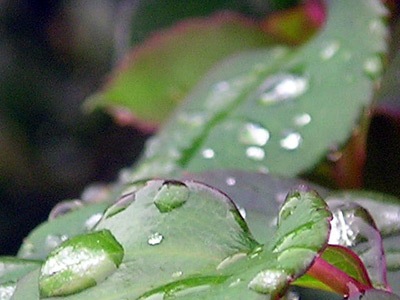 Thousands have lived without love, not one without water.
Thousands have lived without love, not one without water.
— W. H. Auden
Like the earth itself, our bodies are 70 percent water. This also happens to be the proportion of our water supply that the agricultural industry consumes to bring food to our tables. No conversation about sustainable food systems can exclude the topic of water.
While water wars seem like the concerns of distant communities, experts predict that towns across the US will also soon be struggling to provide clean, affordable water to their citizens. An award-winning documentary, Flow, one of the post powerful and elegant films in the recent 3rd I Film Festival, tackles the complex issues embedded in a simple glass of water. From Bolivia to India, from Michigan to our very own California, access to water is being contested.
Water shortages affect California deeply. Earlier this summer, our governor declared the first statewide drought in 17 years, and municipalities across California have been urged to reduce their water use by 20 percent.
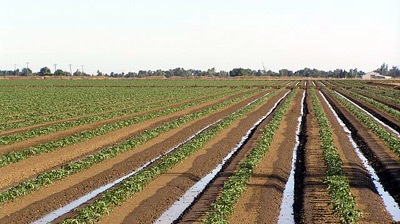
Ask any farmer or rancher or fisherman about water rights or water health, and you’ll tap into the complex, heated politics of water. It’s also a critical issue for environmental health: In nearly every state, citizens’ groups fight threats to the safety of their drinking water, local watersheds and groundwater.
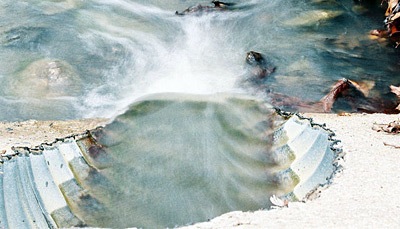
Follow the money to find some of the most critical struggles over water around the world. European-based, multinational corporations that specialize in privatizing municipal water systems, such asSuez and Thames, and beverage companies like Coca-Cola and Nestle, which owns 70 brands of bottled water in North American, have enormous amounts of money at stake in tapping into free water for their own use while selling expensive water back to their consumers. As the race to find clean water is nearing its peak, poor communities in Asia, Africa and Latin America are arriving at their communal pumps or wells to find, quite literally, that corporations have locked up their water supply. Dams, privatization, and pollution have immense ramifications on all forms of water on every continent. If you think wars over oil are tragically absurd, wait until you see citizens arming themselves for a sip of water.
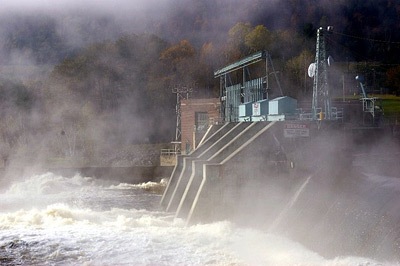
Flow helps viewers understand some of these basic issues. Even more importantly, the film shows how courageous individuals, dedicated researchers, innovative business people, and organizations large and small all contribute to the Blue Revolution. Director Irena Salina interviews a wide variety of people around the world who have implemented real, workable solutions to benefit rather than exploit small municipalities. Even the credits at the end of the film highlight delightful ways companies and community groups work together to guarantee clean, abundant, affordable water for all. Among the most memorable inventions were the unique ultraviolet system developed by <a href=”Waterhealth, a company based in Irvine, California, that encourages the formation of locally controlled micro-utilities along with public health initiatives, and the brightly colored PlayPump, which harnesses the seemingly endless energy of kids to bring up water.
A simple (and fun!) solution to a complex problem.
Flow will be playing next week at the Red Vic Movie House. It’s only engaged for two evenings, though it truly deserves a wider run in many other theatres. Since it may be a while before the documentary is picked up for wider distribution, I highly recommend that you set aside some time next Sunday or Monday evening to see this important, inspiring film. It’s a superb example of a well-made documentary, and its message cannot fail to move every person who sees it. Every one of us drinks water, and everything single thing we touch, let alone all that we consume, depends on the flow of water.
DOCUMENTARY
Flow: For Love of Water
Directed by Irena Salina
Red Vic Movie House
Sunday, November 23 (2:00, 4:00, 7:15, 9:20)
Monday, November 24 (7:15, 9:20)
1727 Haight Street
San Francisco, CA 94117
(415) 668-3994
Map
ACTIONS
What else can you do as an individual to help ensure abundant, clean, inexpensive water for all?
Drink tap water
- Stop purchasing bottled water at home, at restaurants and on the road. The water bottling industry has effectively little regulation, and as the John Hopkins Bloomberg School of Public Health has stated: “Many people do not feel comfortable drinking tap water, so they buy bottled water instead. The truth is that city water is much more highly regulated and monitored for quality. Bottled water is not. It can legally contain many things we would not tolerate in municipal drinking water.”
- Carry your own water bottles or collapsible cups. Flatterware has a 12-ounce cup that can hold either hot or cold drinks and then folds flat when empty. BPA-free water bottles are available fromWatergeeks Laboratories, a company that create new products for consumers that will help “turn the global water crisis upside down” by tapping into tap water. If you dislike the taste of tap water, invest in a filtration system for your faucet or purchase a simple, inexpensive filtering pitcher.
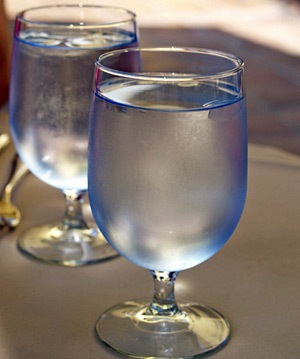
Conserve water in your kitchen
- Install an aerator in your kitchen faucet. EBMUD offers free conservation devices. Water agencies in most cities offer educational materials and similar incentives for water conservation. Check the website of your local water utility company for more information.
- If you own or manage a multi-unit residential building in San Francisco, order a Water-Wise Tenant Kit for your tenants. If you’re a tenant, contact your property manager and convince them to obtain one for all the renters in your building.
- If you have a dishwasher, run only full loads. More recent models tend to be highly water efficient, but do check to be sure when you buy a new one. If you have an older one in your home, instead of rinsing the dishes before loading them in, scrape the food directly into your compost bin or trashcan to save water. If you wash by hand, avoid letting the water run while you wash. Use a large bowl, bin or even the pot you cooked in to hold wash water, and then rinse with as little water as needed.
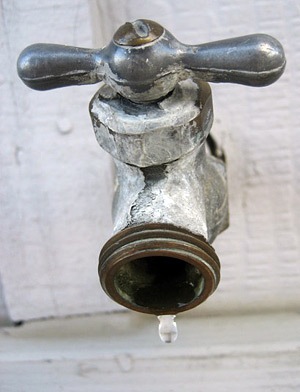
Support water conservation in restaurant kitchens
- If you own a restaurant, train your employees to use techniques of water conservation that are appropriate for a commercial kitchen. Chicago-based Greening Restaurants shares information at their website. SFPUC commercial customers are eligible for a free evaluation, which includes a consultation tailored to their businesses, free water-saving devices and rebates on plumbing upgrades.
- Look for the Thimmakka seal of approval on your favorite neighborhood restaurant or market. By helping ethnic restaurant owners adopt sustainable practices while remaining profitable businesses has already saved over 10.8 million gallons of water. Ajanta in Berkeley, tin’s Tea House Lounge in Walnut Creek, and La Cocina’s kitchen in the Mission District have all benefitted from Thimmakka’s expertise to help them transition to sustainable practices. If your local restaurant doesn’t already take part in Thimmakka’s programs, encourage the owners to contact the organization or send a referral yourself to the nonprofit’s outreach administrators.
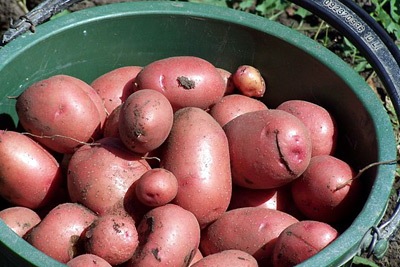
Support dry farmers
- Buy produce from farmers who have learned to grow profitable crops without irrigation. Produce labeled “dry-farmed” refers to fruits and vegetables that are not irrigated after planting. Certain crops weather these dry conditions better, such as grapes, potatoes, and tomatoes. Dry farming generally intensifies their flavors, so like with many sustainable practices, it’s as good for the palate as for the planet.
- If you shop at a farmers market and if it’s not too busy, ask your favorite producers about some of the water issues they face and learn about the ways they’re able to conserve water on their land. Those who can employ dry farming methods are helping to save millions of gallons of water in our state. (View a slideshow of Little Organic Farm, including David Little’s dry-farmed potatoes.)
- To learn the basics of dry farming, including both benefits and challenges, read this detailed overview from the Soil and Health Library. As the writer, a not unbiased farmer in Australia notes, when “the methods of dry-farming are understood and practiced, the practice is always successful; but it requires more intelligence, more implicit obedience to nature’s laws, and greater vigilance, than farming in countries of abundant rainfall.”
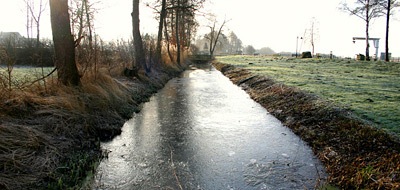
Educate yourself about local water laws
- For those more interested in the colorful history of water in our state, browse the archives of the fascinating exhibit at the UC Berkeley Library on Liquid Gold: California’s Water.
- With agriculture consuming the vast majority of our water supply, California’s politicians, policy makers, agricultural industry and large corporations that will have the most effect on water supply. As a concerned and informed consumer, learn about water laws. The National Technology and Science Center, a department of the Bureau of Land Management, has created an informative page summarizing California’s water rights system, a dual system that incorporates Spanish pueblo rights into the riparian doctrine.
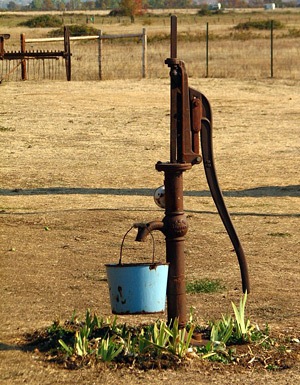
Support the Human Right to Water
- Sign the petition to encourage the United Nations to expand its Universal Declaration of Human Rights to include Article 31: Everyone has the right to clean and accessible water, adequate for the health and well-being of the individual and family, and no one shall be deprived of such access or quality of water due to individual economic circumstance. The actions of individuals — in other words, all the things that you can do above — are more important and effective than any petition, but recognizing water as a right is one of the ways we can voice our concerns. If Article 31 were passed, it would go far in setting a valuable framework for guaranteeing access to water. If the UN considers owning property, holding citizenship, working for a living, receiving an education, enjoying the arts, and resting in leisure, as rights that we all hold by virtue of being human, then surely drinking clean water should be included in their Universal Declaration.
